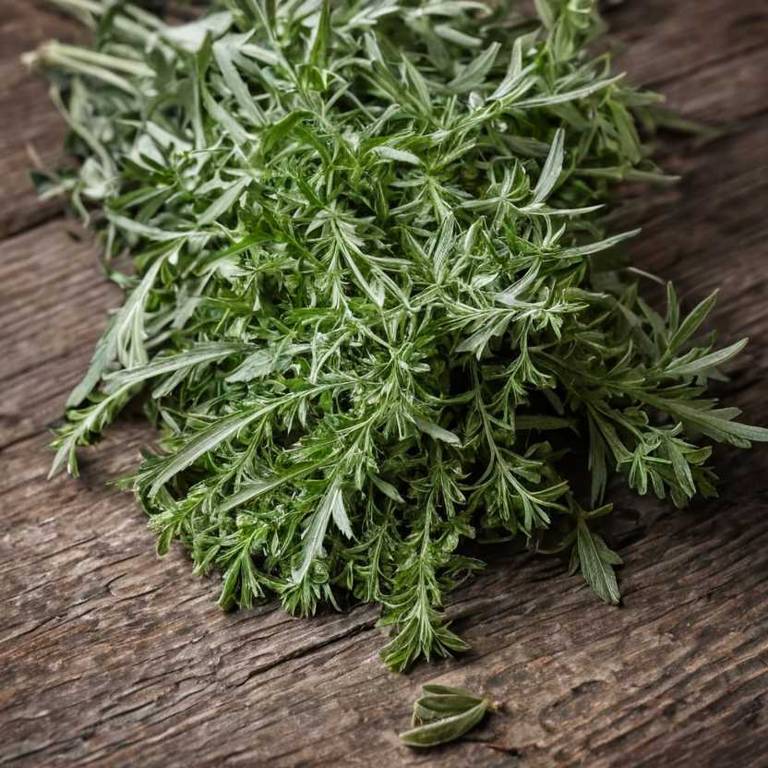By Leen Randell
Updated: Jul 06, 2024
What Are The Medicinal Properties Of Artemisia Vulgaris (Mugwort)?

Artemisia vulgaris, also known as mugwort, has health benefits such as reducing inflammation, relieving menstrual cramps, and acting as a diuretic.
The herb is rich in sesquiterpene lactones, flavonoids, and phenolic acids, which are responsible for its medicinal properties. Medicinal preparations of mugwort include teas, tinctures, and infusions, which can be used to alleviate symptoms of digestive issues and menstrual disorders. Potential side effects include allergic reactions, skin irritation, and interactions with certain medications.
It is essential to consult a healthcare professional before using mugwort, particularly for pregnant or breastfeeding women and individuals with allergies.
This article explains the health benefits, active constituents, medicinal preparations, possible side effects, and precautions related to Artemisia vulgaris.
- What are the health benefits of Artemisia vulgaris?
- What are the active constituents of Artemisia vulgaris?
- What are the medicinal preparations of Artemisia vulgaris?
- What are the possible side effect of using Artemisia vulgaris improperly?
- What precautions to take when using Artemisia vulgaris medicinally?
What are the health benefits of Artemisia vulgaris?
Artemisia vulgaris, also known as mugwort, has health benefits such as reducing inflammation, improving digestion, and supporting liver function.
It has been traditionally used to ease menstrual cramps and alleviate symptoms of menopause. The herb is also believed to have antimicrobial and antifungal properties, making it effective against a range of infections.
Studies suggest that mugwort may also help lower blood sugar levels and promote wound healing.
Here's a detailed article about the 10 health benefits of Artemisia vulgaris.
What are the active constituents of Artemisia vulgaris?
Artemisia vulgaris, also known as mugwort, has active constituents such as thujone, camphor, and sesquiterpenes, which have been found to possess medicinal properties.
Thujone, in particular, has been shown to have anti-inflammatory and antiseptic effects, while camphor has been used to treat various ailments, including skin conditions and respiratory issues.
Sesquiterpenes, on the other hand, have been found to have antioxidant and anti-inflammatory properties.
Here's a detailed article about the 10 active constituents of Artemisia vulgaris.
What are the medicinal preparations of Artemisia vulgaris?
Artemisia vulgaris, also known as mugwort, has medicinal preparations such as infusions, tinctures, and capsules.
The aerial parts of the plant are used to make teas, which can aid digestion and relieve menstrual cramps. Mugwort tincture is often used to stimulate the appetite and relieve flatulence, while capsules are used to treat gastrointestinal disorders.
These preparations are also used in traditional Chinese medicine to promote digestion and relieve bloating.
Here's a detailed article about the 10 medicinal preparations of Artemisia vulgaris.
What are the possible side effect of using Artemisia vulgaris improperly?
Improper use of Artemisia vulgaris, also known as mugwort, increases the chances of experiencing side effects such as nausea, diarrhea, and stomach cramps.
High doses can also lead to liver damage and allergic reactions in some individuals. In rare cases, it may interact with medications, such as blood thinners, and worsen conditions like epilepsy and hypertension.
Proper use and dosing are crucial to minimize these risks.
Here's a detailed article about the 10 most common side effects of Artemisia vulgaris.
What precautions to take when using Artemisia vulgaris medicinally?
Before using Artemisia vulgaris, also known as mugwort, for medicinal purposes, you must take precautions such as consulting a healthcare professional due to its potential interactions with other medications.
Additionally, pregnant or breastfeeding women should avoid using it altogether, as it may stimulate the uterus and cause complications.
It's also essential to start with small amounts to gauge individual tolerance and avoid excessive use, which can cause adverse effects like dizziness and skin irritation.
Here's a detailed article about 10 precautions to take when using Artemisia vulgaris.